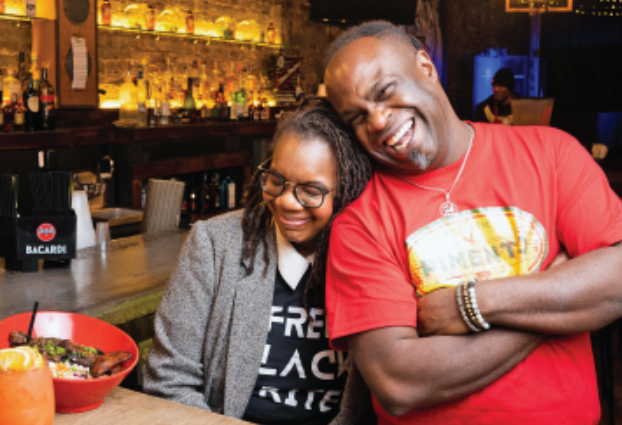Tomme and Dara Beevas—restaurateur and publisher, together—on how food and books can heal a community.
WORDS BY Samantha Sencer-Mura
When I was asked to guest edit this issue around the theme of books and bars, I immediately thought of local power couple Dara and Tomme Beevas. Together, these two embody the theme—Dara is co-founder of local creative publishing agency, Wise Ink, and Tomme is owner of Pimento Rum Bar and Kitchen (which now has two restaurants, and a non-profit, and political arm). Both are architects of systems and movements here in the Twin Cities, bringing a critical eye and thoughtful perspective to everything they do (and they do a lot).
Tomme and Dara are always making big moves and digging into bold ideas, but they are also the type of folks who make sure everyone is fed and cared for. I sat down with the couple on a snowy afternoon at Pimento Rum Bar on Nicollet Avenue over rum punch and goat curry, where we chatted about their individual and intersecting work to create cultural and structural change, how food and books can heal, and what keeps them here in the Twin Cities.
You have both built so much in your respective industries here in the Twin Cities, and you have built it as transplants in a city that is known for being hard to break into. Can you talk about the perspective on the Twin Cities that you bring as outsiders and how that informs your work?
Dara: Tomme and I met in DC–we quickly became friends and then started dating. Tomme moved here for his dream job and I followed him. Our perspective that we bring as transplants: We’ve always seen the Twin Cities as a hotbed for potential. Some of the best artists I’ve ever met live here. Even in the chef world, the culinary space, you have access to some of the best talent in the country here. Minneapolis maybe tricks you into not seeing the talent or genius here.
How does your work intersect?
Tomme: I see food as a unifier and a breaker of barriers. A lot of the community stuff I do is about social liberation. Dara sees storytelling as a way to do the same. Dara does work on cultural reparations. She is the right person to find the people to get our histories right.
Dara: We collaborate in the sense that Pimento is a sanctuary, an actual brick-and-mortar sanctuary for the community. I don’t think we built Pimento with that in mind—we were just committed to the food and culture of Jamaica, and we were excited to have this new culinary experience. But then it became more than just the food. We learned that people enjoyed being in a Black-centered space, having safety here, feeling like family here, a place they can be themselves. There is a psychological safety of being in a space that feels like it was created with you in mind.
Wise Ink on the other side of that coin has been that too. Writers–whether you are a white writer, Black writer, Brown writer–you have felt that there is this elite element to publishing and there’s a gatekeeping element, exclusivity, it isn’t welcoming, and Wise Ink tries to turn that around and be a welcoming space. There’s something special that happens when your publisher is centering you, your goals, your book. We collaborate all the time on events, on how we can both use our businesses to push a needle on an issue, and how we can do it together.
How has your work changed since the murder of George Floyd and the uprising?
Tomme: It’s quadrupled. It unmasked the needs if nothing else. It unmasked the opportunities that we have, and the importance and value of our resources and connections. It was the fire that we needed to figure out how to bring those resources together, to convene meetings between activists and government leaders. If nothing else, it put into focus the work ahead of us, reminding us we are not regular entrepreneurs. It has led us to create Pimento Relief Services–a B corp, Pimento Foundation–a 501c3, and Pimento Political Action Committee. We’ve always been more than a restaurant, but this helped us to create a framework for how we can truly be more than a restaurant, more than a safe space. How do you bring resources to those on the front line of liberation? How do we create a thousand more Pimento-type businesses in our city, focused on economic liberation?
Dara: When Tomme watched video of George Floyd being murdered, afterwards he came in the house with tears streaming down his face. He said, “If I’m going to live here, I refuse for it to remain the same city that could do this to a human being.” He stepped into his natural purpose which has always been around giving. He knew how to build infrastructure in 48 hours to serve protestors. Speaking as his wife, he was fighting for his life at that time. I remember saying to Tomme, “Do not board up Pimento. We built it, but we built it for community, if they want it let them have it.” The opposite happened. The community kept Pimento safe and Pimento kept them safe. We took back the dignity that we lost.
His revolutionary act at that moment was to use everything in his power to make it a safe place for his and mine. To restore joy we are entitled to. We all felt that knee. Black Minnesotans had been telling us that knee was there, as transplants we were a bit protected. Now, we use our businesses to address these things. With books, you can use books to talk about these issues. Through Pimento, you can use the restaurant to host conversations with people who would never be in a room together, it’s neutral ground. It’s hard to talk shit with jerk chicken in your mouth.
Why do you stay in Minnesota? What keeps you in the Twin Cities?
Dara: To quote Tomme Beevas, he ‘was built for the revolution.’ And of course, the revolution happens in the place you never expect it to.
Tomme: I have faith that we are the place to solve these problems. There is no coincidence that the heartland is where the revolution is taking place. We need to clean out the heart and Minnesota is the place where we have the resources to fix the issue. If not here, then where? If not now, then when? If not us, then who?

